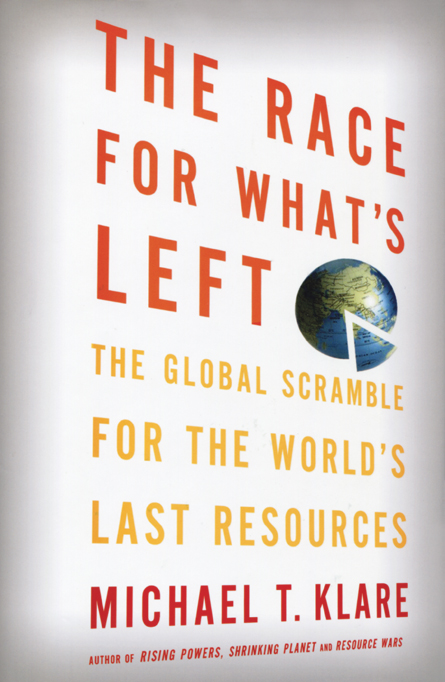Michael Klare, professor of peace and world security studies at Hampshire College, (my alma mater for full disclosure), has written extensively about the geopolitics of oil, the quest for “extreme energy”, exploring to the ends of the Earth for increasingly scarce resources, as well as the re-colonization of North America by the oil industry.
Michael recently has written on the Arctic scramble for the New York Times. His periodic columns on TomDispatch are worth following. Read his most recent essay on the ‘double dip’ oil price collapse and the geopolitical and corporate implications for very expensive oil drilling schemes like Shell’s misadventure to the Alaskan Arctic.
Klare is also the author of numerous books on the subject including The Race for What’s Left (2012); Resource Wars (2001); Blood and Oil (2004) and Rising Powers, Shrinking Planet (2008).
Basically, read all the Michael Klare you can get your hands on and you will be a much smarter person.
I asked Michael for his thoughts on Obama’s trip to the Arctic this week where the President is being challenged to reconcile his “all of the above” energy policy with his awareness of the climate change crisis and policies to address it.
Here is his response, boiling down the Obama Administration’s situation nicely:
The Arctic represents the ultimate irony of climate change. On one hand, it is being altered more rapidly and severely than any other region by climate change, with widespread coastal erosion, habitat destruction, and wildlife endangerment. On the other hand, global warming is melting the sea ice that until now has impeded the exploitation of the Arctic’s vast oil and natural gas reserves, triggering a frenzy of drilling and development by major energy firms – and thus adding to the carbon emissions responsible for climate change in the first place.
In identifying the areas of the world that are most at risk of experiencing a catastrophic “tipping point” from climate change, involving irreversible consequences, the Intergovernmental Panel of Climate Change (IPCC) puts the Arctic first.
“For the Arctic region, new evidence indicates a biophysical regime shift is taking place, with cascading impacts on physical systems, ecosystems, and human livelihoods. For Arctic marine biota, the rapid reduction of summer ice cover causes a tipping element that is now severely affecting pelagic (undersea) ecosystems as well as ice-dependent mammals such as seals and polar bears.” (Report of Working Group II, chap. 18, pp. 1015-16)
But for oil and gas companies like Royal Dutch Shell, the disappearance of summer sea ice means they can now drill for longer periods in the Arctic, making such ventures attractive. Shell has been trying for five years to exploit undersea reserves Alaska’s segments of the Beaufort and Chukchi Seas (southern extensions of the Arctic) and now, with the approval of the Obama administration, is finally about to begin drilling. Such drilling, says Shell, is essential in light of the world’s continuing reliance on fossil fuels and the exhaustion of existing fields in other parts of the world.
For President Obama – now in Alaska to tout his commitment to slowing climate change – these ironies could not be more stark. He is expected to visit coastal villages in the far north to voice concern over the threat from coastal erosion and the melting of permafrost, while also facing protests from environmentalists and indigenous peoples who oppose his approval of Shell’s drilling operations, saying they will accelerate climate change. His defense of the Shell decision, that so long as we continue to consume oil and gas we should produce them here in the USA, sounds to many as pure hypocrisy.
In approving Shell’s action, Obama also seems to be responding to geopolitical considerations: notably, the growing anti-Russian sentiment in Washington. Faced with the decline of its own sub-Arctic oil and gas reserves, Russia seeks to increase its reliance on reserves in the Russian Arctic. Such efforts have been a top priority for the Putin regime, which depends for 50% of its revenues on oil and gas exports.
To consolidate Russia’s presence in the region, Moscow has filed claims to a vast swath of the Arctic’s undersea territory, stretching all the way to the North Pole, and begin a major buildup of its Arctic-capable combat forces. This, in turn, has created some concern among geopolitical thinkers in Washington, who claim the United States is not doing enough to counter Russian advances in the Arctic.
These views were reflected in an article by Steven Lee Myers in the New York Times on August 30, suggestively titled “U.S. Is Playing Catch-Up With Russia in Scramble for the Arctic.” Myers quotes Adm. Paul F. Zukunft, Commandant of the Coast Guard (which conducts most U.S. operations in the Arctic) as complaining of an inadequate US response to recent Russian efforts in the Arctic (as compared to our more vigorous response during the Cold War): “When Russia put Sputnik in outer space, did we sit with our hands in pocket with great fascination and say, ‘Good for Mother Russia’?”
The fact that any US drive to contest Russia in the so-called “scramble” for the Arctic would probably result in more oil and gas drilling – exactly the opposite of what a climate change-focused policy would call for – does not seem to have penetrated the thinking of top US policymakers.

